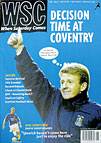 Sunday 1 Blackburn move into the second promotion spot in the First Division with a 5-0 thrashing of Burnley, prompting Graeme Souness to issue a warning: “We’ll be treating every fixture like it’s the last game of our lives.” After a 1-0 home defeat by Wolves, Birmingham’s sights are now set no higher the play-offs, where they could yet be joined by Sheffield United, who win their local derby, 2-1 at Hillsborough. Leicester’s European hopes fade with a 2-0 defeat at Charlton, but Peter Taylor has identified the problem: “We are missing a footballer.”
Sunday 1 Blackburn move into the second promotion spot in the First Division with a 5-0 thrashing of Burnley, prompting Graeme Souness to issue a warning: “We’ll be treating every fixture like it’s the last game of our lives.” After a 1-0 home defeat by Wolves, Birmingham’s sights are now set no higher the play-offs, where they could yet be joined by Sheffield United, who win their local derby, 2-1 at Hillsborough. Leicester’s European hopes fade with a 2-0 defeat at Charlton, but Peter Taylor has identified the problem: “We are missing a footballer.”
The Archive
Articles from When Saturday Comes. All 27 years of WSC are in the process of being added. This may take a while.
 After 22 years of sponsoring the top division in English football, Barclays is as big a part of the football fraternity as the clubs themselves
After 22 years of sponsoring the top division in English football, Barclays is as big a part of the football fraternity as the clubs themselves
When Barclays first sponsored the Football League (as it then was) in 1987, the angry young men (as we then were) at WSC wrote: “What the deal says about the League is this: they believe that Barclays Bank enjoys more warmth and respect in society than football itself.” It was a fair point, particularly as the sum involved was only £4.55 million over three years, which might just be enough to attach your company’s name to Patrick Vieira’s socks these days. It seemed that it wasn’t so much the money the League needed, but reassurance from the corporate world that football had not sunk irredeemably beneath its notice.
 Controversial chairman Bernard Tapie is back at Olympique de Marseille. Patrick Mignon looks at the impact the returning chairman will have and whether he can banish the negativity that surrounded his previous tenure
Controversial chairman Bernard Tapie is back at Olympique de Marseille. Patrick Mignon looks at the impact the returning chairman will have and whether he can banish the negativity that surrounded his previous tenure
Bernard Tapie, the most controversial chairman in French football history, has returned to run Olympique de Marseille, eight years after he was driven out after being found guilty of match-fixing.
 While the Premiership clubs can afford costly measures to keep hooliganism out of their stadiums, the price is being paid lower down the leagues and out of sight of the camera. Mark Rowe reports
While the Premiership clubs can afford costly measures to keep hooliganism out of their stadiums, the price is being paid lower down the leagues and out of sight of the camera. Mark Rowe reports
Graham Hodgetts has the lives of an admittedly less than full Villa Park in his hands. In the control room under a stand roof he stands with his shirt sleeves rolled up, spectacles dangling from his right hand. As Villa’s safety officer – all league clubs have one – he looks calm, but then he was a police officer for 30 years, retiring as superintendent. Leeds are visiting on a January midweek night. There are about a dozen people in the control room, half of them uniformed officers, looking at a dozen CCTV monitors and taking most interest in the images of fans on their feet at the back of a stand, well guarded by police and stewards.
 Gunther Simmermacher reports on a culture of buck-passing in the aftermath of South Africa's latest disaster
Gunther Simmermacher reports on a culture of buck-passing in the aftermath of South Africa's latest disaster
Never again, the football establishment of South Africa vowed after more than 40 fans died at a match between the country’s most popular clubs, Soweto teams Orlando Pirates and Kaizer Chiefs. Fast forward a decade, and the well-meaning platitudes – voiced after 42 fans were crushed to death in the remote town of Orkney on January 13, 1991 – proved less than prophetic. On April 11, 43 more fans died outside Ellis Park stadium in Johannesburg during the Chiefs v Pirates derby.